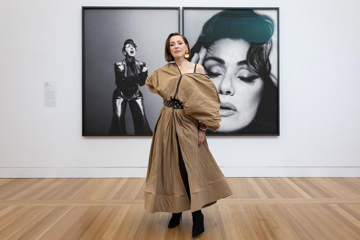Jacob Collier: 'Music Makes Me Feel Unlimited'
Jacob Collier, once the ultimate 'one-man band', talks to Maxim Boon about how the credits for four-part project 'Djesse' are a list of "30 or so" of his favourite musicians from around the world.

When Jacob Collier unleashed his wildly innovative debut album, In My Room, in 2016, he revealed himself as the ultimate one-man band. Across its 11 tracks of dense, jazz-infused electro-funk, exotic instrumental textures laced with intricately harmonised vocals bucked and jived against a bizarre collection of synths and samples. And at the centre of it all was Collier, performing every pitch, beat, lick and cadence.
Given the showboating complexity of the sound pioneered on that record, not to mention the props earned for displaying such sky-high virtuosity, you might assume that Collier must be quite the control freak. In truth, the softly spoken 25-year-old is a gentle genius, whose artistic aims spring from a simple yet profound love of self-expression.
He is, however, deeply ambitious, and having tested his mettle against the challenge of single-handedly writing, performing and producing an album as explosively creative as In My Room, he set his sights on an even more audacious project.
The result is Djesse, a four-volume anthology that somehow defies conventional categorisation to an even greater degree than Collier’s first release. And as if to prove that his musicality needn’t be megalomaniacal, the two volumes of Djesse released thus far have called on a huge array of talent, including a full symphony orchestra, a choir, legendary American close harmony group Take 6, Moroccan lute master Hamid El Kasri, and even Collier’s mum, noted violinist Susan Collier.
It might seem like a giant leap to go from being a solo artist to the mastermind behind such a heavily populated record, but Collier believes the move was inevitable. “It just felt [like] the natural next step,” he insists. “When you have your DNA on every part of the music, there’s a certain level of isolation that comes with that, and I think I was really seeking to break through that with this project. And I guess the goal was to dunk myself in the deepest possible waters of all these weird and whacko musical styles from all over the world, and to see what might happen. Having worked so much on my own, I was very used to a certain sense of control and expectation, so shattering that system, if you like, has been revolutionary, on a personal level, in how it’s changed my way of thinking about music.“
The second volume of Djesse, a record dominated by covers (arranged with Collier's characteristic innovations and a mash-up of world music, jazz, and folk influences), also features a roll call of guest collaborators that reads like a who’s who of music mavericks, including the likes of JoJo, Lianne La Havas, Becca Stevens, dodie and Sam Amidon. Each is a creative mind cut from similar cloth to Collier, which is no accident. “I essentially made a list of 30 or so of my most favourite musicians in the whole world and began to put together a sort of musical narrative that could tell a story involving all of them,” he explains. “It’s been eye-opening to experience what can happen when you walk into a room with a collaborator. You think you have an approximate idea of what’s going to unfold, but then when the music is being made, and the ideas are flowing, everything changes. Embracing that change, and that sense of the unknown, has been just magnificent.”
While Djesse may have brought many diverse artists into Collier’s orbit, he remains at the heart of this record. Even the anthology’s title – a kind of phonetic approximation of Collier’s initials, JC – firmly cements his place as the music’s focal point. But if In My Room created a sound world, then Djesse exists in a sound universe, exploring a musical vision of near-cosmic dimensions. “Music makes me feel unlimited,” Collier says. “You can have an idea and it can be taken as far as it needs to be without clamping down on it, in terms of what is expected, what the rules say you can do, whether a note should go here, or a chord should go there, or a groove should be slightly wonky or weird or whatever. I love that process, disregarding the things that are supposed to be ‘the right way,’ and just following a gut feeling.”








